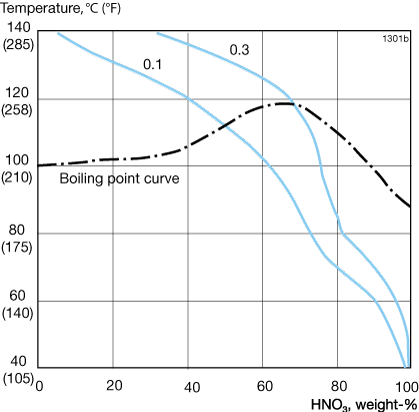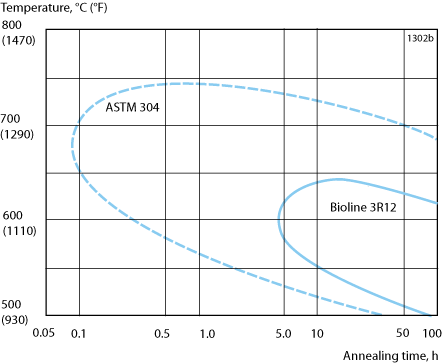Alleima® 3R12 is an austenitic stainless chromium-nickel steel with a low carbon content used for medical and dental instruments. The grade is characterized by:
- Good corrosion resistance
- Excellent toughness
- Good welding properties
Standards
- ASTM: TP304, TP304L
- UNS: S30400, S30403
- EN Number: 1.4301, 1.4306
- W.Nr.: 1.4301, 1.4306
- DIN: X5 CrNi 18 10, X2CrNi 19 11
- SS: 2333, 2352
- AFNOR: Z 2 CN 18.10
- BS: 304S11, 304S31
- JIS: SUS304L, SUS304LTB, SUS304TP
Product standards
- ASTM F899, A213, A269, A312
- ISO 16061
- JIS G3459, G3463
- EN 10216-5
- BS 3605, 3606
- DIN 17456, 17458
- NFA 49-117, 49-217
- SS 14 23 52, 14 23 33
Approval
JIS approval for Stainless Steel Tubes
Chemical composition (nominal)
| C | Si | Mn | P | S | Cr | Ni |
|---|---|---|---|---|---|---|
| ≤0.030 | 0.5 | 1.3 | ≤0.030 | ≤0.015 | 18.5 | 10 |
Subject to agreement, material with extra low Co content can be supplied.
Applications
Thick wall tubes applications :
Alleima® 3R12 is used for medical and dental tools.
Thin wall tubes applications :
Alleima® 3R12 can be used for biopsy punches, mammography machine, brooches, suspension for oxygen tank for hospital mobile beds, surgical and dental tools.
Corrosion resistance
General corrosion
Alleima® 3R12 has good resistance in
- Organic acids at moderate temperatures
- Salt solutions, e.g. sulfates, sulphides and sulphites.
- Caustic solutions at moderate temperatures
Alleima® 3R12 has better resistance than normal type AISI 304 to oxidizing agents, such as nitric acid. Figure 1 shows iso- corrosion in nitric acid for Alleima® 3R12.

Figure 1. Diagram showing iso- corrosion in nitric acid for Alleima 3R12 at the corrosion rates of 0.1 mm/year (4mpy) and 0.3 mm/year (12 mpy).
Intergranular corrosion
Alleima® 3R12 has a low carbon content and therefore better resistance to intergranular corrosion than steels of type AISI 304.
The TTC-diagram, Figure 2, which shows the result of testing for 24 hour in boiling Strauss solution (12% sulfuric acid, 6% copper sulphate) confirms the superior resistance of Alleima 3R12. This is an advantage in complicated welding operations.
The good resistance against intergranular attack of Alleima® 3R12 is also demonstrated in the Huey test (boiling in 65% nitric acid for 5x48h).
A maximum corrosion rate of 0.40 mm/year in the annealed condition and 0.60 mm/year in the sensitized (675°C) condition can be met.
Alleima® 3R12 with its controlled and low impurity level, shows better results than ordinary AISI 304L or 321.

Figure 2. TTC-diagram for Alleima® 3R12 (AISI 304L) and AISI 304.
Pitting and crevice corrosion
The steel may be sensitive to pitting and crevice corrosion even in solutions of relatively low chloride content. Molybdenum-alloyed steels have better resistance improves with increasing molybdenum content.
Stress corrosion cracking
Austenitic steels are susceptible to stress corrosion cracking. This may occur at temperatures above about 60°C (140°F) if the steel is subjected to tensile stresses and at the same time comes into contact with certain solutions, particularly those containing chlorides. Such service conditions should therefore be avoided. Conditions when plants are shut down must also be considered, as the condensates which are then formed can develop conditions that leads to both stress corrosion cracking and pitting.
In applications demanding high resistance to stress corrosion cracking we recommend the austenitic-ferritic steel SAF 2304.
Gas corrosion
Alleima® 3R12 can be used in
- Air up to 850°C (1560°F)
- Steam up to 750°C (1380°F)
- Synthesis gas (ammonia synthesis) up to about 550°C (1020°F).
Creep behavior should also be taken into account when using the steel in the creep range.
In flue gases containing sulphur, the corrosion resistance is reduced. In such environments the steel can be used at temperatures up to 600-750°C (1110-1380°F) depending on service conditions. Factors to consider are whether the atmosphere is oxidizing or reducing, i.e. the oxygen content, and whether impurities such as sodium and vanadium are present.
Bending
Annealing after cold bending is not normally necessary, but this point must be decided with regard to the degree of bending and the operating conditions. Heat treatment, if any, should take the form of stress relieving or solution annealing, see under heat treatment.
Hot bending is carried out at 1100-850°C (2010-1560°F) and should be followed by solution annealing.
Forms of supply
Dimension range for tubes, thick wall
Seamless tube and pipe in Alleima® 3R12 is supplied in dimensions up to 260 mm outside diameter in the solution annealed and white-pickled condition or solution annealed in a bright-annealing process.
U-tubes can be delivered on request.
| Alleima 3R12 is stocked in a wide range of sizes according to ISO and ANSI. Details of our manufacturing and stock programme are given in catalogue S-110-ENG. |
Dimension range for tubes, thin wall
OD : 0.5 - 50.80 mm
thickness : 0.1 - 3 mm
Fine tube tolerances :
- Thickness tolerance : +/- 10%
- OD tolerance : +/- 0.75% with a minimum of +/-0.02 mm
- Roughness
for OD> 5mm Ra (outside) < 0.4 (by polishing)
for ID>3.2mm Ra (inside)< 0.4 - this possibility depends on thickness/diameter ratio
Specific roughness can be done on request - Internal cleaning can not be done for inside diameter below 4 mm
All products supplied either in the annealed and cold worked condition to provide mechanical properties as required
Heat treatment
The tubes are normally delivered in heat treated condition. If additional heat treatment is needed after further processing the following is recommended.
Stress relieving
850-950°C (1560-1740°F), cooling in air.
Solution annealing
1000-1100°C (1830-2010°F), rapid cooling in air or water.
Mechanical properties
Thin wall tubes
Alleima® 3R12 can be supplied in bright annealed or cold worked condition with a Rm : 860-1100 MPa
Thick wall tubes
For tube and pipe with wall thickness greater than 10 mm (0.4 in.) the proof strength may fall short of the stated value by about 10 MPa (1.4 ksi).
At 20°C (68°F)
Mechanical properties can be set according to your demands.
| Tensile strength | Proof strength | Elong. | Hardness | ||||||
|---|---|---|---|---|---|---|---|---|---|
| Rm | Rp0.2a | Rp1.0a | Ab | A2- | |||||
| MPa | ksi | MPa | ksi | MPa | ksi | % | % | HRB | |
| Annealed | 515-660 | 75-100 | ≥210 | ≥30 | ≥40 | ≥35 | ≥45 | ≥35 | ≤90 |
| Cold worked (min) | 700 | 101 | ≥600 | ≥80 | ≥18 | ||||
1 MPa = 1 N/mm2
a) Rp0.2 and Rp1.0 correspond to 0.2% offset and 1.0% offset yield strength, respectively.
b) Based on L0 = 5.65 ÖS0 where L0 is the original gauge length and S0 the original cross-section area.
Impact strength
Due to its austenitic microstructure, Alleima® 3R12 has very good impact strength both at room temperature and at cryogenic temperatures.
Tests have demonstrated that the steel fulfils the requirements according to the European standards EN 13445-2 (UFPV-2) ( (min. 60 J (44 ft-lb) at -270 oC (-455 oF)) and EN 10216-5 (min. 60 J (44 ft-lb) at -196 oC (-320oF).
At high temperatures
| Temperature | Proof strength | |
|---|---|---|
| °C | Rp0.2 | Rp1.0 |
| MPa | MPa | |
| min. | min. | |
| 50 | 190 | 215 |
| 100 | 165 | 190 |
| 150 | 150 | 175 |
| 200 | 140 | 165 |
| 250 | 130 | 155 |
| 300 | 125 | 150 |
| 350 | 120 | 145 |
| 400 | 115 | 140 |
| 450 | 110 | 135 |
| 500 | 105 | 130 |
| 550 | 100 | 125 |
| 600 | 95 | 120 |
| Temperature | Proof strength | |
|---|---|---|
| °F | Rp0.2 | Rp1.0 |
| ksi | ksi | |
| min. | min. | |
| 200 | 24 | 28 |
| 400 | 20 | 24 |
| 600 | 18 | 22 |
| 800 | 16 | 20 |
| 1000 | 15 | 18 |
| Temperature, | Creep-rupture strength (ISO- values) | ||||
|---|---|---|---|---|---|
| °C | °F | 10 000 h | 100 000 h | ||
| MPA | ksi | MPa | ksi | ||
| approx. | approx. | approx. | approx. | ||
| 550 | 1020 | 195 | 28.3 | 115 | 16.6 |
| 575 | 1065 | 147 | 21.3 | 93 | 13.5 |
| 600 | 1110 | 122 | 17.6 | 74 | 10.7 |
| 625 | 1155 | 100 | 14.5 | 58 | 8.4 |
| 650 | 1200 | 79 | 11.5 | 45 | 6.5 |
| 675 | 1245 | 64 | 9.2 | 33 | 4.8 |
| 700 | 1290 | 48 | 7.0 | 23 | 3.3 |
Physical properties
Density: 7.9 g/cm3, 0.29 lb/in3
| Temperature | |||
|---|---|---|---|
| °C | °F | W/m °C | Btu/ft h °F |
| 20 | 68 | 15 | 8.5 |
| 100 | 200 | 16 | 9.5 |
| 200 | 400 | 18 | 10.5 |
| 300 | 600 | 20 | 12 |
| 400 | 800 | 22 | 13 |
| 500 | 1000 | 23 | 14 |
| 600 | 1200 | 25 | 15 |
| 700 | 1300 | 26 | 15 |
| Temperature | |||
|---|---|---|---|
| °C | °F | J/kg °C | Btu/lb °F |
| 20 | 68 | 475 | 0.11 |
| 100 | 200 | 500 | 0.12 |
| 200 | 400 | 530 | 0.13 |
| 300 | 600 | 560 | 0.13 |
| 400 | 800 | 580 | 0.14 |
| 500 | 1000 | 600 | 0.14 |
| 600 | 1200 | 615 | 0.15 |
| 700 | 1300 | 625 | 0.15 |
| Temperature, °C | Per °C | Temperature, °F | Per °F |
|---|---|---|---|
| 30-100 | 16.5 | 86-200 | 9 |
| 30-200 | 17 | 86-400 | 9.5 |
| 30-300 | 17.5 | 86-600 | 10 |
| 30-400 | 18 | 86-800 | 10 |
| 30-500 | 18.5 | 86-1000 | 10 |
| 30-600 | 18.5 | 86-1200 | 10.5 |
| 30-700 | 19 | 86-1400 | 10.5 |
1) Mean values in temperature ranges (x10-6)
| Temperature | |||
|---|---|---|---|
| °C | °F | MPa | ksi |
| 20 | 68 | 200 | 29.0 |
| 100 | 200 | 194 | 28.2 |
| 200 | 400 | 186 | 26.9 |
| 300 | 600 | 179 | 25.8 |
| 400 | 800 | 172 | 24.7 |
| 500 | 1000 | 165 | 23.5 |
Welding
The weldability of Alleima® 3R12 for medical application is good. Welding must be carried out without preheating and subsequent heat treatment is normally not required. Suitable methods of fusion welding are gas-shielded arc welding TIG/GTAW and MIG/GMAW, with the TIG/GTAW method as first choice.
For Alleima® 3R12, heat input of <2.0 kJ/mm and interpass temperature of <150°C (300°F) are recommended.
Recommended filler metals
TIG/GTAW or MIG/GMAW welding
ISO 14343 S 19 9 L / AWS A5.9 ER308L (e.g. Exaton 19.9.L)
Disclaimer: Alleima is not providing any products or services that are intended or may be construed to be recommending or otherwise advising on, in any manner, the design, suitability, appropriateness or effectiveness, from a medical/biological/safety perspective, of any medical material, instrument and/or medical device.